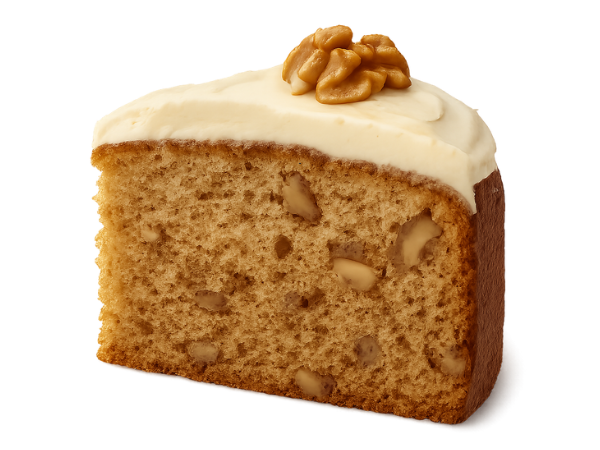
Walnut Cake
Caffeine
20–40 mg
Note: Caffeine levels in walnut cake depend on whether coffee or espresso is included in the recipe. Traditional walnut cake without coffee contains no caffeine. Coffee and walnut cake recipes typically use brewed coffee or espresso, which introduces caffeine.
| Attribute | Value |
|---|---|
| Caffeine Level | Moderate |
| Serving Size (slice) | 130g |
| Caffeine | 20–40 mg |
| Caffeine per 100 g | 15–30 mg |
| Calories | 420 kcal |
| Sugar | 25 g |
Walnut cake is a beloved dessert known for its rich, nutty flavor and moist texture. While walnuts themselves are caffeine-free, some recipes incorporate coffee or espresso, which can introduce caffeine into the final product.
What Is Walnut Cake?
Walnut cake is a classic baked dessert that features chopped or ground walnuts as a primary ingredient. It’s often enjoyed with tea or coffee and can be made with or without added coffee flavoring.
Here are the key characteristics of walnut cake:
- Nut-Based Texture – Walnuts add crunch and richness to the cake.
- Moist Crumb – Often made with oil or butter for a soft, tender bite.
- Versatile Flavor – Can be paired with vanilla, cinnamon, or coffee for added depth.
- Popular Variations – Includes coffee and walnut cake, carrot and walnut cake, and chocolate walnut cake.
- Homemade or Store-Bought – Available in bakeries or easily made at home.
Whether served plain or frosted, walnut cake is a comforting treat that balances earthy flavors with sweet indulgence.
Key Ingredients and Their Impact
The ingredients in walnut cake not only influence its flavor and texture but also determine its nutritional value and caffeine content. Coffee-infused versions will naturally contain caffeine, while traditional recipes without coffee are caffeine-free.
Common ingredients include:
- Walnuts – Provide healthy fats, protein, and antioxidants.
- Flour – Forms the structural base of the cake.
- Eggs – Bind ingredients and add moisture.
- Sugar – Sweetens the cake and contributes to browning.
- Butter or Oil – Adds richness and keeps the cake moist.
- Coffee or Espresso (optional) – Introduces caffeine and enhances flavor.
- Baking Powder/Soda – Helps the cake rise.
- Vanilla Extract – Adds aromatic sweetness.
Each ingredient plays a role in the final product, and the inclusion of coffee is the primary factor affecting caffeine levels.
Caffeine Content per Slice of Walnut Cake
The caffeine content in a slice of walnut cake depends on whether coffee is used in the recipe. A standard slice (about 130g) of coffee and walnut cake may contain a modest amount of caffeine.
Typical caffeine content per slice:
- Traditional Walnut Cake (no coffee) – 0mg
- Coffee and Walnut Cake (with brewed coffee) – 10–25mg
- Espresso-Infused Walnut Cake – 30–50mg
- Chocolate Walnut Cake (with cocoa) – 5–15mg
If you’re sensitive to caffeine or monitoring your intake, it’s important to check whether the recipe includes coffee or chocolate, both of which contribute to caffeine levels.
Caffeine Content per Cup of Walnut Cake Batter
Before baking, the caffeine concentration in walnut cake batter can be estimated based on the amount of coffee or espresso added. One cup of batter (about 240ml) may contain varying caffeine levels depending on the recipe.
Estimated caffeine per cup of batter:
- No Coffee Added – 0mg
- 1 tbsp Instant Coffee – 30–40mg
- ¼ cup Brewed Coffee – 25–35mg
- 1 shot Espresso – 60–75mg
- Cocoa Powder (2 tbsp) – 24mg
These values can help bakers adjust their recipes to suit dietary preferences or caffeine sensitivity.
Caffeine Content per Serving Size
Serving sizes vary depending on how the cake is sliced and served. A typical serving size ranges from 100g to 150g, and caffeine content will scale accordingly.
Caffeine estimates per serving:
- Plain Walnut Cake – 0mg
- Coffee and Walnut Cake – 20–40mg
- Chocolate Walnut Cake – 10–25mg
- Double Espresso Walnut Cake – 60–80mg
For those looking to enjoy walnut cake without the buzz, choosing a recipe without coffee or chocolate is the safest option.
Nutritional Facts of Walnut Cake
Walnut cake is a calorie-dense dessert due to its fat and sugar content, but it also offers nutritional benefits from walnuts and eggs. Here’s a general breakdown per 130g slice:
| Attribute | Value |
|---|---|
| Serving Size | 1 slice (130g) |
| Sugar | 20–30g |
| Calories | 216–497kcal |
| Total Fat | 15–25g |
| Protein | 2–5g |
| Carbohydrates | 30–45g |
Note: Nutritional values can vary based on ingredients and preparation methods. Cakes made with oil tend to be lower in saturated fat, while those with butter may have higher cholesterol. Coffee-infused versions contain caffeine, while plain walnut cakes do not.
